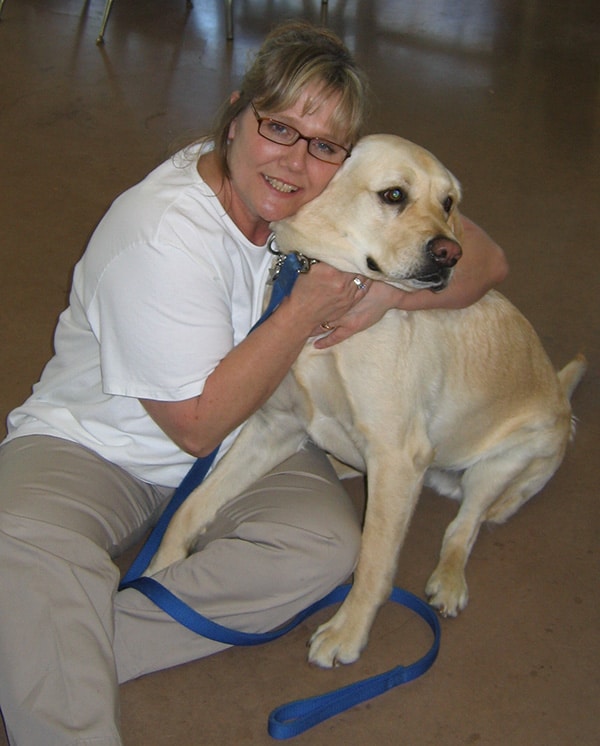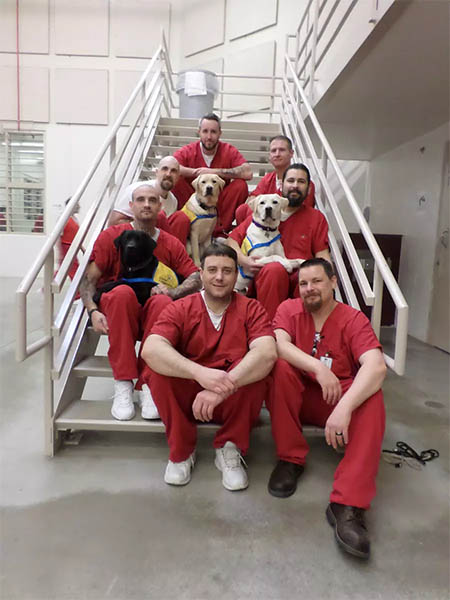Home » Get Involved » Ways to Volunteer » Become a Volunteer Puppy Raiser » Prison Puppy Raising
Prison Puppy Raising
Canine Companions puppies have a special purpose in life, growing up to provide enhanced independence for people with disabilities. The Canine Companions prison puppy raising program not only benefits the puppies, but it also provides a positive impact on the incarcerated program participants as well.
The Canine Companions prison puppy raising program has made great strides since its inception in 1995 at the Coffee Creek Correctional Center in Wilsonville, Oregon. It has expanded to include facilities throughout the United States, including Alabama, Arizona, California, Colorado, Florida, Oregon, Texas and Washington.
- <5% recidivism for people that participate in the program
- Puppies raised in prison programs graduate at a 10% higher rate than those in traditional homes.

Meet Sharon:
Sharon served seven and a half years at Coffee Creek Correctional Center for robbery and was one of the select few chosen for the prison puppy raising program. After an application, interview and rigorous selection process, she received a puppy who accompanied her during her daily work tasks as well as at dinner and recreation times. Prior to Sharon’s release from prison, she helped create nurturing and enriching lives for four Canine Companions puppies, including Roca, Caitlyn, Will and Anza. She cared for, socialized and trained basic skills with lots of love and formed strong bonds with the puppies she raised.
While speaking at a Canine Companions graduation ceremony after her release, Sharon said, “The puppies are our whole existence inside, although we have jobs and other activities, our constant companions come first.” She went on to explain how being a puppy raiser gave her purpose, and transformed her life. She shared, “I always had something to look forward to each and every day. Being a puppy raiser was a self-esteem builder for me and kept me from becoming hard hearted. I learned discipline, how to put something ahead of myself, and finally, I took responsibility for my actions.”
Coffee Creek Correctional Facility
Read an article about the Canine Companions prison puppy raising program at the Coffee Creek Correctional Facility.
Frequently Asked Questions
The facility assumes the cost of keeping the puppies assigned to their students. This would include transportation of the puppies to and from the Canine Companions regional training center, vet care, food, grooming equipment, crates, leashes, toys and training.
A puppy class trainer can be a Canine Companions employee, volunteer or an employee of the institution. The puppy handlers are responsible for the same socialization and training as any volunteer puppy raiser.
Potential incarcerated puppy handlers are selected by the facility with guidelines provided by Canine Companions. The Canine Companions puppy program manager conducts a placement and training seminar with those selected to be sure they are appropriate with puppies and committed to the program.
Although no environment, inside or outside of a prison setting is 100% risk free, the prison program participants go through a rigorous selection process prior to raising a puppy. If they are selected, they must remain clear of any disciplinary action to stay in the program.
The main difference is prison puppies are on a set repetitive schedule because of the confined environment in which they are being raised. This schedule is that of their puppy raiser, these puppies accompany the handlers throughout the day: mealtimes, daily work assignments, recreational periods, etc. Additionally, specific times have been incorporated in their schedule for feeding, toileting, training, and exercising the puppies. In the evening the puppies are crated in the cells. Periodically non-incarcerated volunteers take the puppies outside of the prison environments to acclimate them to a variety of public settings (roads, stores, children, other animals, sounds, and noises) they would not normally experience in the prison setting. This is an important element in the proper socialization of a Canine Companions puppy.
Handlers participate in weekly training classes. The puppy raisers are also given “training’ time every day to practice skills with the puppies. Structured classes are held at the prison anywhere from once a day to once a week. Each prison program agrees to adhere to the Canine Companions Puppy Raising guidelines, and the participants follow the Puppy program materials closely.
Publicly-run prisons do not receive any state funding for their programs and thus rely on the generosity of private donations and grants secured by Canine Companions.
Contact Canine Companions for more information on the prison puppy raising

